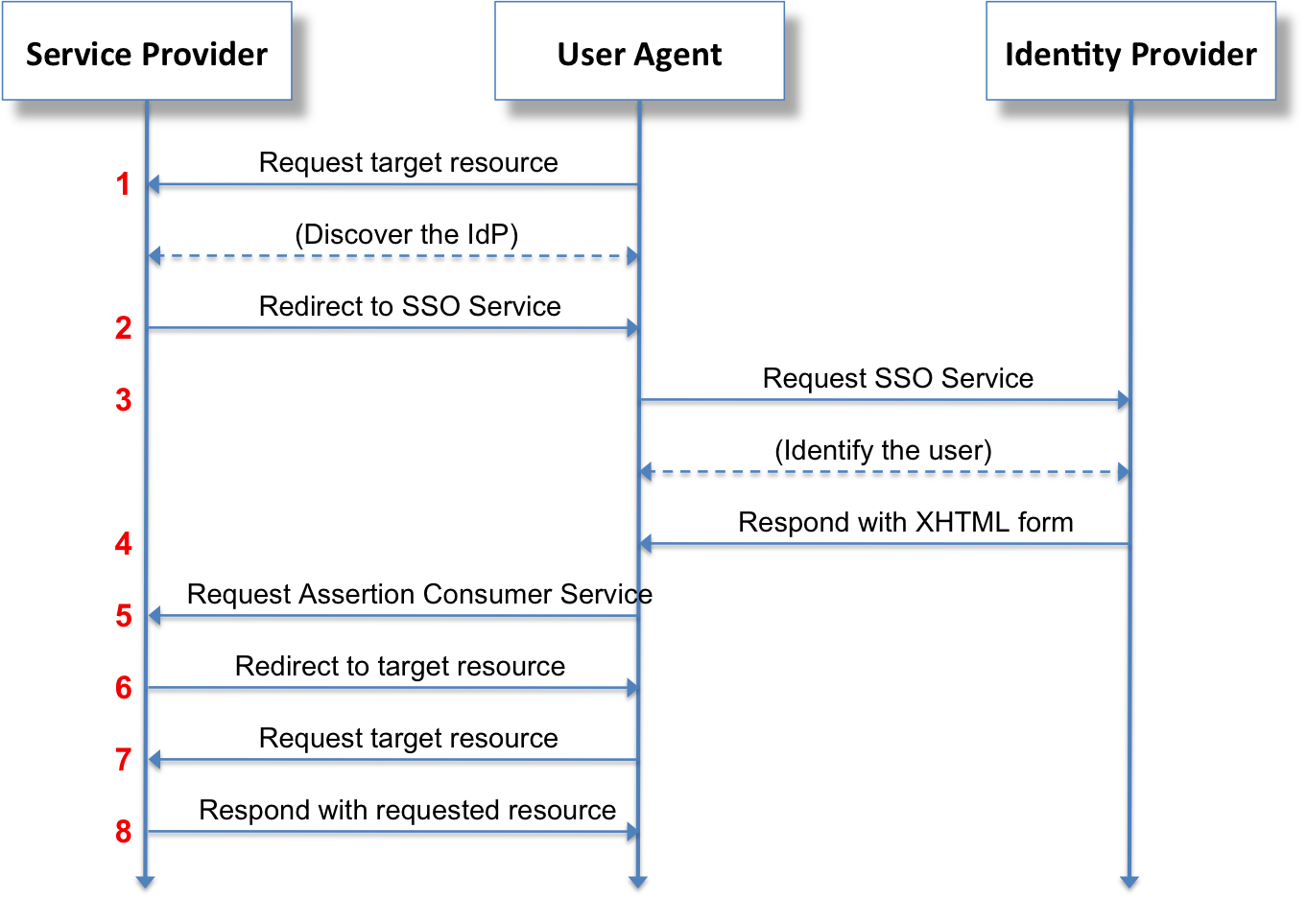#Use SSO authentication locally
This chapter describes how to enable the SSO authentication for development purpose.
#How SSO works ?
SAMLv2 protocol as it is a popular standard in the industry.Security Assertion Markup Language 2.0 (SAML 2.0) is a version of the SAML standard for exchanging authentication and authorization data between security domains. SAML 2.0 is an XML-based protocol that uses security tokens containing assertions to pass information about a principal (usually an end user) between a SAML authority, named an
Identity Provider, and a SAML consumer, named aService Provider.—Source Wikipedia
The Identity Provider offers user authentication as a service, and the Service Provider could be considered as a client that will ask to authenticate a user.
The content exchanged between the IdP and the SP must be signed, that’s why we have to configure those entities with Certificates and Private keys.
#Outbound single sign-on
Akeneo PIM is implementing Outbound SAML, that can also be called SP-initiated Single Sign-On (SSO) or traditional SAML. In an outbound SAML transaction a Service Provider (SP) like a website or an application redirects a user to a designated Identity Provider (IDP) for authentication and authorization. The IDP asks for the user’s credentials and upon successful authentication redirects the user to the protected content.
All the exchanges, redirections between the browser, the Service Provider and the Identity Provider could be represented as follows:

#Setting up the Identity Provider (IdP)
#Without Docker
You can install an IdP server or use any SaaS service (Azure AD for example) that respect the SAMLv2 protocol.
The configuration of the IdP depends on the solution you choose so you’ll have to refer to its documentation.
You will have to configure the users:
Add the users you’ll want to be able to login into the pim (the user must exists in the pim).
The attribute
akeneo_uidwill have to be sent in the Authentication response, and the value will have to match an existing pim user’susernameoremailattribute.
You will have to configure the Service Provider information with the following data:
EntityId: http://your.akeneo-pim.url/saml/metadata
Logout url: http://your.akeneo-pim.url/saml/logout
ACS url: http://your.akeneo-pim.url/saml/acs
You will have to retrieve the IdP certificate, it will be needed to configure the Service Provider on the Akeneo PIM side.
#Using Docker
You can use the following IdP server image, named sso-idp-server, in the docker-compose.yml file.
sso-idp-server:
image: 'kristophjunge/test-saml-idp'
ports:
- '${DOCKER_PORT_SSO_IDP:-8082}:8080'
volumes:
- './docker/sso_authsources.php:/var/www/simplesamlphp/config/authsources.php'
environment:
SIMPLESAMLPHP_SP_ENTITY_ID: '${AKENEO_PIM_URL:-http://localhost:8080/}/saml/metadata'
SIMPLESAMLPHP_SP_ASSERTION_CONSUMER_SERVICE: '${AKENEO_PIM_URL:-http://localhost:8080/}/saml/acs'
SIMPLESAMLPHP_SP_SINGLE_LOGOUT_SERVICE: '${AKENEO_PIM_URL:-http://localhost:8080/}/saml/logout'
networks:
- 'pim'
You will find, below, an example of sso_authsources.php file.
<?php
$config = array(
'example-userpass' => array(
'exampleauth:UserPass',
'julia:julia' => array(
'akeneo_uid' => array('julia'),
),
'mary:mary' => array(
'akeneo_uid' => array('mary'),
),
),
);
This container will expose the 8082 port, you can override this value in the .env file.
You can access the IdP administration page at the following url: http://localhost:8082/simplesaml.
docker/sso_authsources.php.The configuration of the Service Provider is automatically provided by environment variables in the docker-compose.yml file line 58 (SIMPLESAMLPHP_SP_ENTITY_ID) of your standard archive.
#Setting up the Service Provider (SP)
Go to the sso configuration page, under
System/SAML-based Single Sign-OnEnable the feature using the “SSO Enable” toggle button
Fill the form with the values provided by your IdP server
Then click the Save button
If everything went fine, you’ll be logged out and redirected to the IdP login form
#For the IdP provided in the docker-compose.yml
Entity ID:
http://localhost:8082/simplesaml/saml2/idp/metadata.phpLogin URL:
http://localhost:8082/simplesaml/saml2/idp/SSOService.phpLogout URL:
http://localhost:8082/simplesaml/saml2/idp/SingleLogoutService.phpCertificate:
MIIDXTCCAkWgAwIBAgIJALmVVuDWu4NYMA0GCSqGSIb3DQEBCwUAMEUxCzAJBgNVBAYTAkFVMRMwEQYDVQQIDApTb21lLVN0YXRlMSEwHwYDVQQKDBhJbnRlcm5ldCBXaWRnaXRzIFB0eSBMdGQwHhcNMTYxMjMxMTQzNDQ3WhcNNDgwNjI1MTQzNDQ3WjBFMQswCQYDVQQGEwJBVTETMBEGA1UECAwKU29tZS1TdGF0ZTEhMB8GA1UECgwYSW50ZXJuZXQgV2lkZ2l0cyBQdHkgTHRkMIIBIjANBgkqhkiG9w0BAQEFAAOCAQ8AMIIBCgKCAQEAzUCFozgNb1h1M0jzNRSCjhOBnR+uVbVpaWfXYIR+AhWDdEe5ryY+CgavOg8bfLybyzFdehlYdDRgkedEB/GjG8aJw06l0qF4jDOAw0kEygWCu2mcH7XOxRt+YAH3TVHa/Hu1W3WjzkobqqqLQ8gkKWWM27fOgAZ6GieaJBN6VBSMMcPey3HWLBmc+TYJmv1dbaO2jHhKh8pfKw0W12VM8P1PIO8gv4Phu/uuJYieBWKixBEyy0lHjyixYFCR12xdh4CA47q958ZRGnnDUGFVE1QhgRacJCOZ9bd5t9mr8KLaVBYTCJo5ERE8jymab5dPqe5qKfJsCZiqWglbjUo9twIDAQABo1AwTjAdBgNVHQ4EFgQUxpuwcs/CYQOyui+r1G+3KxBNhxkwHwYDVR0jBBgwFoAUxpuwcs/CYQOyui+r1G+3KxBNhxkwDAYDVR0TBAUwAwEB/zANBgkqhkiG9w0BAQsFAAOCAQEAAiWUKs/2x/viNCKi3Y6blEuCtAGhzOOZ9EjrvJ8+COH3Rag3tVBWrcBZ3/uhhPq5gy9lqw4OkvEws99/5jFsX1FJ6MKBgqfuy7yh5s1YfM0ANHYczMmYpZeAcQf2CGAaVfwTTfSlzNLsF2lW/ly7yapFzlYSJLGoVE+OHEu8g5SlNACUEfkXw+5Eghh+KzlIN7R6Q7r2ixWNFBC/jWf7NKUfJyX8qIG5md1YUeT6GBW9Bm2/1/RiO24JTaYlfLdKK9TYb8sG5B+OLab2DImG99CJ25RkAcSobWNF5zD0O6lgOo3cEdB/ksCq3hmtlC/DlLZ/D8CJ+7VuZnS1rR2naQ==
#Setting up the SSO logs purge
The PIM stores SSO related errors and warnings in a dedicated table. In order to cleanup log entries from this table (to avoid it to grow indefinitely), a command is available:
$ bin/console pimee:sso:rotate-log <max-number-of-days-to-keep>
#Example
The following command will keep up to 10 days of log entries for the SSO authentication.
$ bin/console pimee:sso:rotate-log 10
#FAQ
#What if I’ve wrongly configured my admin user and I can’t access the PIM?
An original login form is here as a fallback in this situation, you can access it here: http://your.akeneo-pim.url/user/login
#How can I debug authentication errors ?
Various errors can happen, those errors could be due to incorrect configuration on IdP side or SP side.
pimee_sso_logs) to make them easily available to you through the PIM UI.Regarding the IdP:
* For the one provided in docker-compose.yml, you can check logs outputed by the container docker logs -f your_sso-idp-server_container-name
* For custom configuration of the IdP, refer to the documentation.
Found a typo or a hole in the documentation and feel like contributing?
Join us on Github!